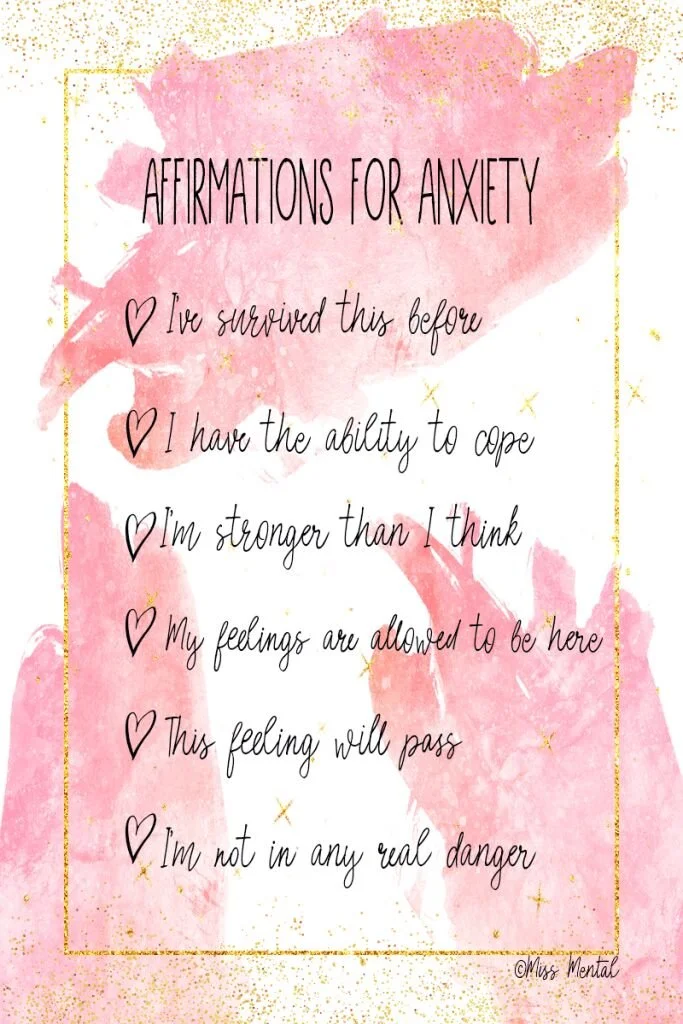The Benefits of Affirmations for Anxiety
Affirmations are positive, intentional statements designed to challenge negative or unhelpful thoughts. When used consistently, affirmations can be a powerful tool for managing anxiety.
1. Rewiring Negative Thought Patterns
Anxiety often stems from repetitive, negative thought loops (e.g., "I can't handle this," or "Something bad will happen"). Affirmations help interrupt these patterns by replacing them with constructive, empowering thoughts. Through neuroplasticity, the brain can form new neural pathways. Repeating affirmations encourages the brain to adopt more positive, adaptive ways of thinking over time.
2. Reducing Catastrophic Thinking
Anxiety frequently involves catastrophising—assuming the worst-case scenario. Affirmations like "I am safe in this moment" or "I can handle challenges as they come" help ground individuals in the present and reduce the tendency to spiral into fear-based thinking.
3. Promoting Self-Compassion
Many individuals with anxiety struggle with self-criticism or feelings of inadequacy. Affirmations such as "I am doing my best, and that is enough" foster self-compassion, which is linked to reduced anxiety and improved emotional resilience.
4. Activating the Relaxation Response
Repeating affirmations can have a calming effect on the nervous system. When paired with deep breathing or mindfulness, affirmations can help activate the parasympathetic nervous system, counteracting the fight-or-flight response triggered by anxiety.
5. Building a Sense of Control
Anxiety often involves feeling out of control. Affirmations like "I have the power to choose my thoughts" or "I am capable of managing my emotions" remind individuals that they have agency over their mental state, which can reduce feelings of helplessness.
6. Encouraging a Growth Mindset
Affirmations can help individuals shift from a fixed mindset (e.g., "I’ll always feel this way") to a growth mindset (e.g., "I am learning to manage my anxiety"). This perspective fosters hope and resilience, which are crucial for long-term mental health.
7. Enhancing Emotional Regulation
By focusing on positive, calming statements, affirmations can help individuals regulate their emotions more effectively. This is particularly useful during moments of acute anxiety, as affirmations can serve as a grounding tool.
8. Improving Self-Efficacy
Affirmations reinforce a sense of capability and confidence. Statements like "I have overcome challenges before, and I can do it again" remind individuals of their strengths and past successes, which can reduce anxiety about future uncertainties.
9. Creating a Daily Ritual of Positivity
Incorporating affirmations into a daily routine (e.g., morning or bedtime) provides a consistent opportunity to focus on positive thoughts. This practice can set a tone of calm and optimism for the day or help unwind at night.
The Role of Therapy in Crafting Authentic Affirmations
While affirmations can be a helpful self-help tool, therapy can play a crucial role in helping individuals navigate and create affirmations that feel authentic and meaningful to them. For some, generic affirmations may feel forced or disconnected from their lived experience, which can lead to frustration or even increased anxiety. A therapist can work collaboratively with the individual to explore their unique challenges, values, and strengths, and guide them in crafting affirmations that resonate on a deeper level.
Therapy also provides a safe space to address the underlying beliefs and thought patterns that fuel anxiety. By working through these issues, individuals can develop affirmations that are not only positive but also grounded in their personal growth and self-awareness. This process ensures that affirmations are not just words but powerful, intentional statements that align with the individual’s journey toward healing and resilience.
